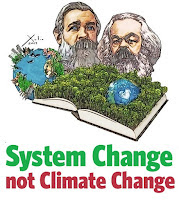Environment activist Derek Wall of the Green Party has received favourable reviews from the Socialist Party, albeit not fully endorsed, here, here, here, and here, for instance.
The following are extracts from an interview he conducted discussing his article entitled “Imperialism is the Arsonist: Marxism’s Contribution to Ecological Literatures and Struggles,” about Marx’s contribution to ecological thought.
Engels, for example, wrote The Condition of the English Working Class in the 1840s. While this is near to the beginning of his writings it was already indicating that air and water pollution were an environmental threat. His notion of social murder encompassed hunger and poverty and such the effect of poisonous pollution, social murder is a concept that might cover the deaths from extreme weather we are already encountering from climate change.
In his ‘Letters from Wuppertal’ written back in 1839 Engels notes both air and water pollution as serious ills, ‘Work in low rooms where people breathe more coal fumes and dust than oxygen — and in the majority of cases beginning already at the age of six — is bound to deprive them of all strength and joy in life.’
At various points in Capital Marx addresses problems that might be identified by environmentalists today such as food additives and deforestation. Capital provides perhaps the clearest application of Marxist thought to the environment, when Marx notes in volume three of our duty to future generations:
"Even an entire society, a nation, or all simultaneously existing societies taken together, are not the owners of the earth. They are simply its possessors, its beneficiaries, and have to bequeath it in an improved state to succeeding generations as boni patres familias [good heads of the household]."
Engels, while not using the then newly coined term ‘ecology’, reveals his understanding of the science, based on relationships between species, that can lead to unexpected effects. This is from his text The Part played by Labour in the Transition from Ape to Man:
"Let us not, however, flatter ourselves overmuch on account of our human victories over nature. For each such victory nature takes its revenge on us. Each victory, it is true, in the first place brings about the results we expected, but in the second and third places it has quite different, unforeseen effects which only too often cancel the first. The people who, in Mesopotamia, Greece, Asia Minor and elsewhere, destroyed the forests to obtain cultivable land, never dreamed that by removing along with the forests the collecting centres and reservoirs of moisture they were laying the basis for the present forlorn state of those countries."
Marx, Ecology, and Politics: An Interview with Dr. Derek Wall — Hampton Institute (hamptonthink.org)
Via RobertS


No comments:
Post a Comment